 NASA announced that it has named rock on Mars in honour of the iconic English band, The Rolling Stones. The space agency revealing that the “Rolling Stones Rock” was a stone that was sent rolling after NASA’s InSight lander touched down on the Mars’ surface. NASA announced that it has named rock on Mars in honour of the iconic English band, The Rolling Stones. The space agency revealing that the “Rolling Stones Rock” was a stone that was sent rolling after NASA’s InSight lander touched down on the Mars’ surface. |
| Source: The Business Standard |
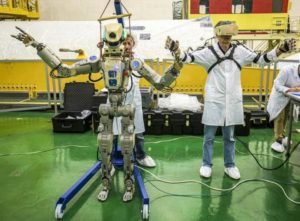 Russia launched an unmanned rocket carrying a life-size humanoid robot named Fedor, (Final Experimental Demonstration Object Research). It is a silvery anthropomorphic robot stands 1.80 metres (5 foot 11 inches) tall and weighs 160 kilogrammes (353 pounds). Fedor will spend 10 days learning to assist astronauts on the International Space Station. It blasted off in a Soyuz MS-14 spacecraft from Russia’s Baikonur cosmodrome in Kazakhstan. Russia launched an unmanned rocket carrying a life-size humanoid robot named Fedor, (Final Experimental Demonstration Object Research). It is a silvery anthropomorphic robot stands 1.80 metres (5 foot 11 inches) tall and weighs 160 kilogrammes (353 pounds). Fedor will spend 10 days learning to assist astronauts on the International Space Station. It blasted off in a Soyuz MS-14 spacecraft from Russia’s Baikonur cosmodrome in Kazakhstan. |
| Source: The Hindu |
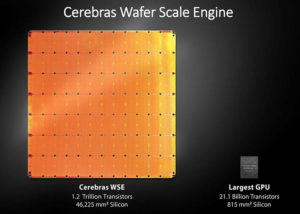 Artificial intelligence(AI) company Cerebras Systems has unveiled the world’s largest single silicon-based processor named Cerebras Wafer Scale Engine(WSE). This chip has 1.2 trillion transistors, the basic on-off electronic switches that are the building blocks of silicon chips. The rectangular shape chip measures 21.5cm sq (8.5in sq), comes with 400,000 AI (Artificial Intelligence) cores and 18 gigabytes of on-chip memory. Artificial intelligence(AI) company Cerebras Systems has unveiled the world’s largest single silicon-based processor named Cerebras Wafer Scale Engine(WSE). This chip has 1.2 trillion transistors, the basic on-off electronic switches that are the building blocks of silicon chips. The rectangular shape chip measures 21.5cm sq (8.5in sq), comes with 400,000 AI (Artificial Intelligence) cores and 18 gigabytes of on-chip memory. |
| Source: The BBC |
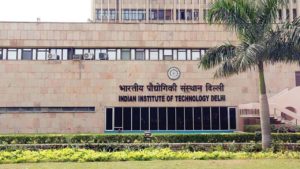 IIT-Delhi, Ankita Gulati was awarded the NCPEDP-Mphasis Universal Design Award 2019 for developing a multisensory kit named TouchVision. IIT-Delhi-incubated start-up working on the design and development of inclusive learning resources for visually impaired people. TouchVision aims at digital inclusion for 253 million persons with visual impairment globally. IIT-Delhi, Ankita Gulati was awarded the NCPEDP-Mphasis Universal Design Award 2019 for developing a multisensory kit named TouchVision. IIT-Delhi-incubated start-up working on the design and development of inclusive learning resources for visually impaired people. TouchVision aims at digital inclusion for 253 million persons with visual impairment globally. |
| Source: The Hindu |
 Cab aggregator Ola announced acquihiring of Pikup.ai, an Artificial Intelligence startup based in Bengaluru. Acquihiring typically refers to a transaction in which the staff of the target company join the acquiring firm. Pikup.ai uses autonomous technologies like AI, computer vision and sensor fusion to provide seamless AI-powered solutions for businesses. Cab aggregator Ola announced acquihiring of Pikup.ai, an Artificial Intelligence startup based in Bengaluru. Acquihiring typically refers to a transaction in which the staff of the target company join the acquiring firm. Pikup.ai uses autonomous technologies like AI, computer vision and sensor fusion to provide seamless AI-powered solutions for businesses. |
| Source: The Hindu |
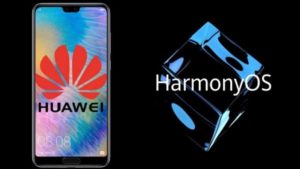 Chinese telecom giant Huawei unveiled its own operating system will be called the HongmengOS, known in English as the HarmonyOS. The operating system will be released as an open-source platform worldwide to encourage adoption. HarmonyOS is future-oriented and designed to be more smooth and secure, and is completely different from Android and iOS. Chinese telecom giant Huawei unveiled its own operating system will be called the HongmengOS, known in English as the HarmonyOS. The operating system will be released as an open-source platform worldwide to encourage adoption. HarmonyOS is future-oriented and designed to be more smooth and secure, and is completely different from Android and iOS. |
| Source: The Economics Times |
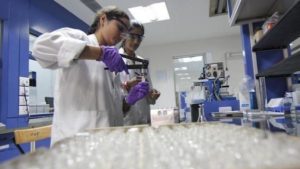 Researchers from IIT Kharagpur have developed a low-cost diagnostic device which can perform various pathological tests by using blood taken from a fingerprick. The device requires only a paper strip based kit integrated with a smartphone to enable analytics and readout functions and an LED light for imaging. Researchers from IIT Kharagpur have developed a low-cost diagnostic device which can perform various pathological tests by using blood taken from a fingerprick. The device requires only a paper strip based kit integrated with a smartphone to enable analytics and readout functions and an LED light for imaging. |
| Source: The Livemint |
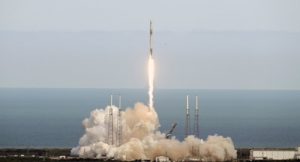 US carrier rocket Falcon 9 loaded with Israeli AMOS-17 communication satellitesuccessfully lifted off from a space centre in Florida, spacecraft manufacturer SpaceX. Amos-17, built by Boeing, will provide Ka, Ku and C-band signal transmission and expand Israeli communications satellite operator Spacecom’s coverage in Africa, the Middle East and Europe. US carrier rocket Falcon 9 loaded with Israeli AMOS-17 communication satellitesuccessfully lifted off from a space centre in Florida, spacecraft manufacturer SpaceX. Amos-17, built by Boeing, will provide Ka, Ku and C-band signal transmission and expand Israeli communications satellite operator Spacecom’s coverage in Africa, the Middle East and Europe. |
| Source: The DD News |
 A team of researchers at the Indian Institute of Technology, Guwahati has developed a portable device to detect bacteria without cell culture or microbiological assays. The hand-held device, with the bio-compatible sensor, can also diagnose time-critical illnesses such as meningitis. This research has enabled rapid detection of bacteria,which is not just important in healthcare, but also in anti- bioterrorism measures and environmental monitoring. A team of researchers at the Indian Institute of Technology, Guwahati has developed a portable device to detect bacteria without cell culture or microbiological assays. The hand-held device, with the bio-compatible sensor, can also diagnose time-critical illnesses such as meningitis. This research has enabled rapid detection of bacteria,which is not just important in healthcare, but also in anti- bioterrorism measures and environmental monitoring. |
| Source: The Business Standard |
 Scientists have developed an automated system that uses artificial intelligence (AI) to detect and capture fast radio bursts (FRBs) in real-time. FRBs are mysterious and powerful flashes of radio waves from space, thought to originate billions of light-years from the Earth. This research is done by Scientists of the Swinburne University of Technology in Australia. Scientists have developed an automated system that uses artificial intelligence (AI) to detect and capture fast radio bursts (FRBs) in real-time. FRBs are mysterious and powerful flashes of radio waves from space, thought to originate billions of light-years from the Earth. This research is done by Scientists of the Swinburne University of Technology in Australia. |
| Source: The DD News |
You need to login to perform this action.
You will be redirected in
3 sec
